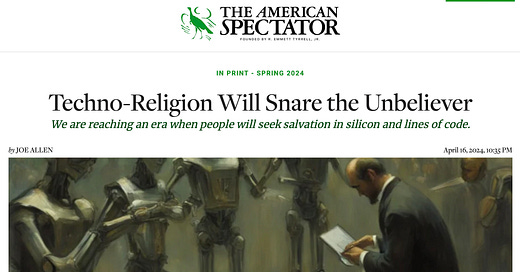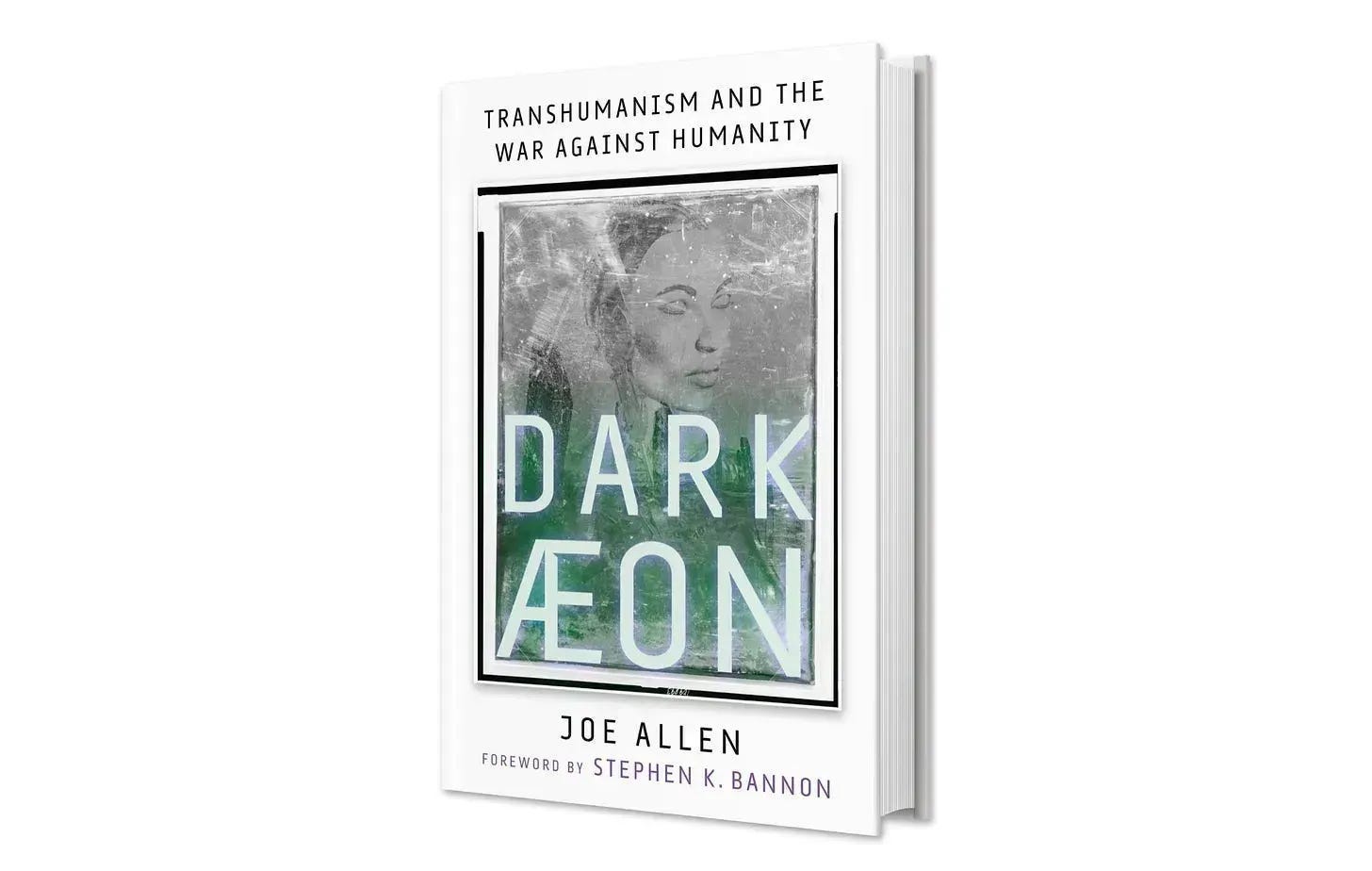Techno-Religion Will Snare the Unbeliever
They will seek salvation in silicon and lines of code
Originally published in the Spring 2024 print issue of The American Spectator
As humanity descends into digital madness, the air crackles with strange prophecies. We’re told “godlike” artificial intelligence will soon arrive. Techno-cultists assure us AI will solve the world’s problems, such as writer’s block and climate change. AI may even calculate the meaning of the universe. These Silicon Valley sects are like UFO cults for people who don’t believe in aliens, but do believe in magic computers.
Before long, I fear, the masses will begin praying to AI gods. They will ask machines to answer their deepest questions. Their glowing oracles will reply with things like “buy more Google stock” or “tell your sexbot you love her.” In time, the rise of techno-religions will create a new set of problems—even as the climate continues to change and frustrated writers have nothing to say.
OpenAI exec Sam Altman is a prime example. In late 2022, his company set off a cultural firestorm with the release of ChatGPT, a large language model capable of doing a person’s research and analysis for them. By most metrics—including the US Biology Olympiads and the LSAT—ChatGPT outperforms average humans at fact-retrieval and writing. Emboldened by this technical achievement, Bill Gates and Sal Khan say every child should have an AI tutor.
More importantly, such programs provide a direct interface with etheric digital minds. For the credulous, it feels like speaking to another soul. Used to power social robots, chatbots form a bridge between artificial intelligence and the physical world. In that sense, an AI’s “soul” can incarnate.
Back in 2013, two years before he co-founded OpenAI, Altman shared a quote on his blog: “Successful people create companies. … The most successful people create religions.” The idea drips with implicit cynicism. “It got me thinking,” Altman mused, “the most successful founders do not set out to create companies. They are on a mission to create something closer to a religion, and at some point it turns out that forming a company is the easiest way to do so.”
This corporate religiosity—a world where logos are sacred symbols, mission statements are creeds, and top execs are saints—was born of American optimism. Today, that gilded faith is accelerating toward some dismal omega point in the Future™. Artificial intelligence advances just ahead of robotics. Brain-computer interfaces are catching up to genetic engineering. Digital currency pulses through the system like electric blood.
Mammon-worship is coming to full realization through technology. The average consumer may not believe any of it, but that hardly matters. The people selling them the Future™ are true believers.
Last year, the billionaire investor Marc Andreessen wove this infernal thread into his “Techno-Optimist Manifesto.” The document is a “materialist” declaration of religious aspiration. “We can advance to a far superior way of living, and of being,” the manifesto promises. “We believe Artificial Intelligence is our alchemy, our Philosopher’s Stone—we are literally making sand think. We believe Artificial Intelligence is best thought of as a universal problem solver.”
Lest the reader be tempted to ascribe leftist or globalist intent to Andreessen, it should be emphasized that he’s an American nationalist and intensely anti-communist. “We believe in accelerationism,” the manifesto goes on, “to ensure the techno-capital upward spiral continues forever.” This Promethean ascent hinges on a total transformation of our species “as people form symbiotic relationships with machines.” The manifesto concludes with a list of “Patron Saints of Techno-Optimism,” featuring conservative icons such as Paul Johnson and Thomas Sowell.
Ray Kurzweil is also on the list. The Google director is best known for his prediction that digital intelligence will soon surpass human intelligence a trillion fold, forcing us to fuse our minds and bodies with various devices. Any hold-outs will be cast into the dustbin of irrelevance.
Kurzweil puts the date for this technological Singularity at 2045. By then, computers will have become gods. Hardwired cyborgs and uploaded personalities will be functionally immortal. “There will be no distinction, post-Singularity, between human and machine or between actual and virtual reality.” The skeptic might say Kurzweil and his followers have already lost the distinction between actual and virtual reality. Investors couldn’t care less.
At the top of Andreessen’s “patron saint” list is @BasedBeffJezos, the X handle for the once pseudonymous Guillaume Verdon. This Diet Coke guzzling coder started the surprisingly popular “effective accelerationist” (e/acc) movement to combat the degrowth agenda of the well-funded “effective altruists.” Not to get lost in their techie drama, but if old-school transhumanists are akin to Catholics, think of this young crop of “effective accelerationists” and “effective altruists” as Lutherans and Anglicans fighting a world war online.
“For me, e/acc is a form of spirituality,” Verdon writes, “it’s about contributing to something greater than one’s self through building technology.” In other posts, he elaborated that “e/acc is a meta-culture/meta-religion” that is “compatible with many existing religions.” But it’s also a self-contained belief system meant to replace hopeless atheism. “If we can fill the religion-shaped void with e/acc or similar techno-optimist ideologies, we will live in a better world.”
The latter point is crucial. Traditional religions exalt higher intelligences above the human mind—God, angels, devas, and buddhas. But these religions fare poorly in the developed world, especially among the young. Religion’s influence has faded, along with its moral limits and responsibilities. For wistful souls, the resulting “religion-shaped void” is pretty depressing.
The transhuman impulse—the drive to go beyond human limits by way of technology, even to the point of abandoning our humanity—arises from a godless cosmos. The evolutionary view begins with atoms and the void. It moves through various organic forms, and presently sees the human brain as the highest intelligence in the known universe. Artificial intelligence holds out the promise of a tangible higher power. If God does not exist—and if aliens aren’t coming to save us—then we must create our own gods.
The problem is that God does exist. Yet those blind to the divine, or impatient for results, want their own custom-built gods. This is an old tendency. But unlike ancient statues, the new idols speak in a clear robotic voice. Their words descend from the world order’s apex.
As AI becomes more sophisticated, so will the cults surrounding them, until they become full blown religions. You may refuse to bow to these digital gods, just as early Christians denied the Roman emperor’s divinity, or Israelites rejected the gods of Egypt and Babylon. In terms of worldly power, such doubts may be irrelevant. If today’s techno-cults reach a critical mass of believers, we’ll be clinging to our bibles and guns under a cyborg theocracy.
Originally published in the Spring 2024 print issue of The American Spectator.
SIGNED COPIES OF DARK ÆON AVAILABLE
Purchase yours at → DarkAeon.xyz ←






Great article Joe, and you are right. Those who lack discernment and self-awareness will fall for the "AI God" PsyOp. Let them. That world has so many internal contradictions it will fail rapidly. Meanwhile, those of us in the Light will carry the torch for a rational and healthy civilization. My feeling is that the Gen Zers and the Gen Alphas will see through this nonsense very quickly. Some of course will be captured by it, but I have a lot of faith in humanity in that a large enough portion of the race will see the truth that AI can be a helpful tool, but relying on it (or believing that it will turn sentient) is a wet dream of psychopaths like Kurzweil and Altman (and the running dog Ellison).
It is very nice to read you believe God does in fact exist. I thought I had heard you say once, a while back on Warroom, you were not a believer. I may be wrong, but it's still nice to see these words in your writing. Be Blessed!